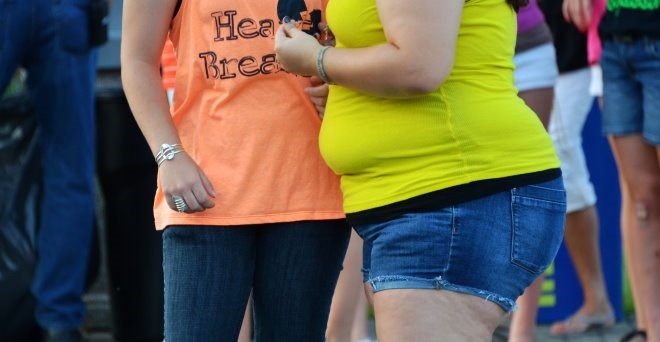 Trying for a baby is usually an exciting and joyous time (and a little nerve-wracking, too!), but, for the estimated 10% of couples who experience difficulty conceiving, it can also prove to be rather taxing.
Trying for a baby is usually an exciting and joyous time (and a little nerve-wracking, too!), but, for the estimated 10% of couples who experience difficulty conceiving, it can also prove to be rather taxing.
If you’re having trouble getting pregnant you may have heard of some methods which claim to boost fertility. The problem is, with so much information out there, it’s difficult to distinguish truth from myth. Does placing an acorn under your mattress increase fertility? Or eating a lot of pineapple? It’s impossible to know what to believe.
Something you might have heard if you are overweight or underweight is that maintaining a healthy weight can greatly improve chances of successfully conceiving. But, how much research has been done into this, and what does the research actually report? What is a “healthy weight” when it comes to fertility?
Let’s take a look.
Weight And Fertility In Women
- What Is The Link Between Weight And Fertility In Women?
- Can Being Underweight Cause Infertility?
- What Is A Healthy Weight For Women?
- Great Ways To Lose The Inches
- So Does Weight Affect Fertility?
- Fertility Book Tips
What Is The Link Between Weight And Fertility In Women?
Extensive research has been conducted on fertility and weight loss and findings tend to suggest that there is a definite negative correlation between obesity and fertility rates. There are so many studies that have published similar reports that it would be both highly time-consuming and repetitive to discuss them all, and I know you’re anxious to get back to the baby-making! So let’s take a look at just a few.
Researchers have been finding similar results for years across the different generations. Looking at studies conducted 40 years apart in 1967 and 2007 it was found that women who were 30lbs or more overweight, or had a Body Mass Index (BMI) of 30 or more, were more likely to have irregular menstrual cycles and longer cycles of over 36 days. Longer cycles typically mean that ovulation occurs less frequently, leaving fewer opportunities for conception to occur.
Looking specifically at the relationship between weight and ovulation, an article simply entitled ‘Polycystic Ovary Syndrome‘ published in The Lancet found that women suffering from the condition were primarily overweight. Polycystic Ovary Syndrome (PCOS) is a rather complex disorder which affects fertility and as such a direct cause is yet to be identified. Therefore, whether obesity is a cause or effect of PCOS isn’t clear. Nevertheless, losing some of the overweight is often effective to enhance fertility for anyone suffering from PCOS (and being overweight).
It is widely thought that the way obesity affects fertility is all down to insulin. Obese women, and women with PCOS, tend to display unusually high levels of insulin (you’ve probably heard that obesity is a risk factor in developing type 2 diabetes – well, this is why). The body prevents ovulation as a way of trying to manage this insulin overload.
A study cited in the 1996 Human Reproduction found that levels of insulin significantly decreased in obese women once they had successfully completed a weight loss program, and that 80% reported more regular menstrual cycles afterwards. 29% of participants had successfully conceived following weight loss. Medication given to overweight women that reduces high insulin levels has been found to induce ovulation. However, it is not without risks and research has shown women who receive this medication are more likely to deliver a low-weight baby.
Can Being Underweight Cause Infertility?
The above research definitely suggests that losing weight can be beneficial for increasing fertility if you’re carrying around a few extra lbs. But what if you actually need to put a few lbs on? Can underweight women get pregnant? Well, yes. Just as overweight women can get pregnant. However, women who are underweight may also find that they experience some difficulty conceiving.
A study published already in the 1988 Fertility and Sterility found that underweight women were almost five times more likely to suffer from infertility than their healthier counterparts. Once again, the cause of this was deemed to be either irregular or limited ovulation resulting from hormonal imbalances within the body.
What Is A Healthy Weight For Women?
Have you ever heard your friends talking about the great new pair of size 8 jeans they just bought, and suddenly felt huge in your size 14s? Are you wondering if you need to lose weight to get pregnant? Or perhaps gain weight? Weight is individual to each of us and what’s healthy for some may not be healthy for you.
Healthcare professionals use the BMI chart to determine if you’re a healthy weight. You’ve probably already seen or heard of this system and may even have used it before. Your place on the chart is concluded from your weight and height measurements. A BMI of between 18.5 and 25 is considered healthy. Less than 18.5 and you’re deemed underweight, more than 25 and you’re officially overweight. And you’ll be categorized as ‘medically obese’ if that number goes above 30.
You calculate your BMI using the following formula:
![]()
Great Ways To Lose The Inches
Research shows that losing weight may be a good idea if your BMI is above 25. So what are the best ways to shed those pesky lbs? Any good healthcare professional will tell you that the most simple, risk-free and effective method of weight loss is healthy eating and exercise. And losing weight for fertility is certainly no different. In fact, a study published in 1998 explicitly specified that ‘fertility is improved through exercise and sensible eating patterns’.
If you’re new to exercising, don’t worry! Even gentle exercise can make a huge difference. Some effective and inexpensive options are swimming, cycling and just getting out and going for a walk. Try and aim for at least 30 minutes of physical activity each day. And cutting out a few calories may be easier than you think. Whether it’s swapping your sugary cereal for some porridge oats, or swapping a chocolate bar for a fruit salad, the numbers all add up. Nutritionists suggest that women should be consuming around 2000 calories per day, and that healthy and sustainable weight loss should not exceed 2 lbs per week.
A growing amount of research is showing us that focusing on reducing the amount of sugar and quick carbohydrates is much more efficient for weight loss than striving for a low fat diet. So, increase your exercising and cut out as much as you can of sugar and quick carbs, such as white flour, potatoes, pasta and white rice.
If you want more guidance on how to lose weight in a healthy way and without starving yourself, nutritionist Mike Geary has produced an excellent diet and training program. The marketing of the program is geared toward men for some odd reason (a lot of men in the pictures) but worked equally well for women. I have actually asked Mr. Geary to stop using all these muscles men on his website, but I haven’t been able to convince him yet. But his dieting advice in particular are excellent! And since men’s fertility are also affected by their weight, why not try Geary’s advice together with your hubby!
(If you are very overweight or have serious health issues, it is very important to discuss with a doctor when you want to start working to lose weight.)
So Does Weight Affect Fertility?
As we’ve seen, I think we can conclue that there is a link between weight and fertility in women.There is a link between weight and fertility in men too, which you can read about here.
Weight loss for fertility may be beneficial in some case but, with there also being a strongly-proven link between being underweight and infertility, losing weight is not always the answer. The ideal weight for women to get pregnant varies depending on height, but generally speaking you should aim to have a BMI between 18.5 and 25.
It is also important to maintain a healthy weight throughout pregnancy. Women who are overweight during pregnancy are more likely to develop gestational diabetes which can increase the risk of having a baby with a high birth weight and jaundice, and a study published in 2005 found that underweight women were, sadly, at increased risk of miscarriage.
Fertility Book Tips
If you want to more information and tips for getting pregnant, check out any of these books.
- Taking Charge of Your Fertility, 20th Anniversary Edition: The Definitive Guide to Natural Birth Control, Pregnancy Achievement, and Reproductive Health
- The Impatient Woman’s Guide to Getting Pregnant
- It Starts with the Egg: How the Science of Egg Quality Can Help You Get Pregnant Naturally, Prevent Miscarriage, and Improve Your Odds in IVF
More Fertility Articles
- What Affects the Woman’s And Man’s Odds Of Getting Pregnant
- Acupuncture For Fertility – Yes Or No?
- How Mom’s Diet May Affect The Gender Of Her Baby
References for the link between weight and fertility in women
- National Health Service on Getting Pregnant
- Polycystic Ovary Syndrome in The Lancet
- The association of obesity with infertility and related menstrual abnormalities in women
- Current Opinion in Endocrinology, Diabetes & Obesity
- Infertility: Effects of weight loss on the hormonal profile in obese, infertile women
- Strategies for the use of insulin-sensitizing drugs to treat infertility in women with polycystic ovary syndrome
- Risk of ovulatory infertility in relation to body weight
- Obesity and reproductive disorders: a review
- Induced Ovulation in Underweight Women

Paula Dennholt founded Easy Baby Life in 2006 and has been a passionate parenting and pregnancy writer since then. Her parenting approach and writing are based on studies in cognitive-behavioral models and therapy for children and her experience as a mother and stepmother. Life as a parent has convinced her of how crucial it is to put relationships before rules. She strongly believes in positive parenting and a science-based approach.
Paula cooperates with a team of pediatricians who assist in reviewing and writing articles.






